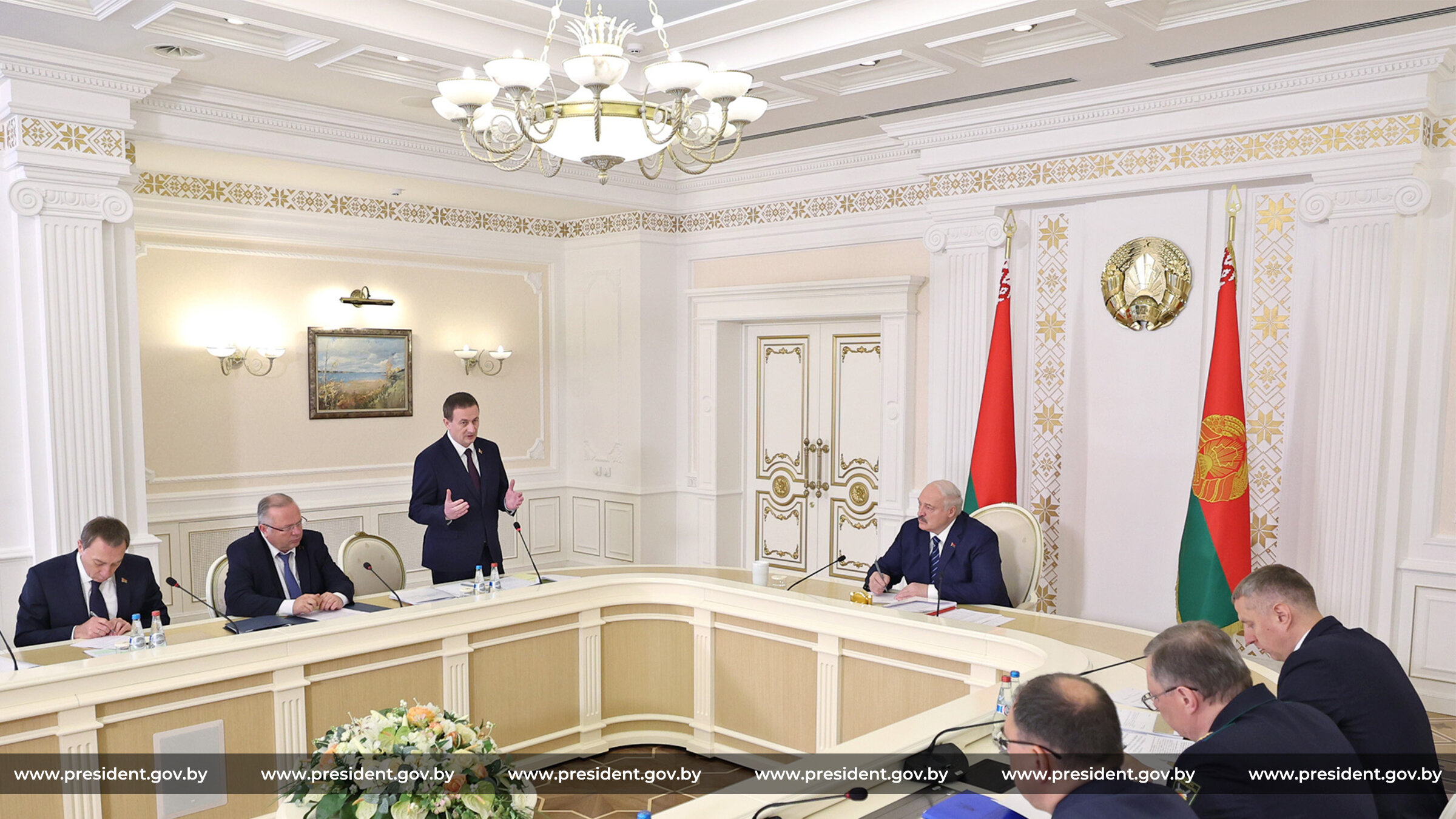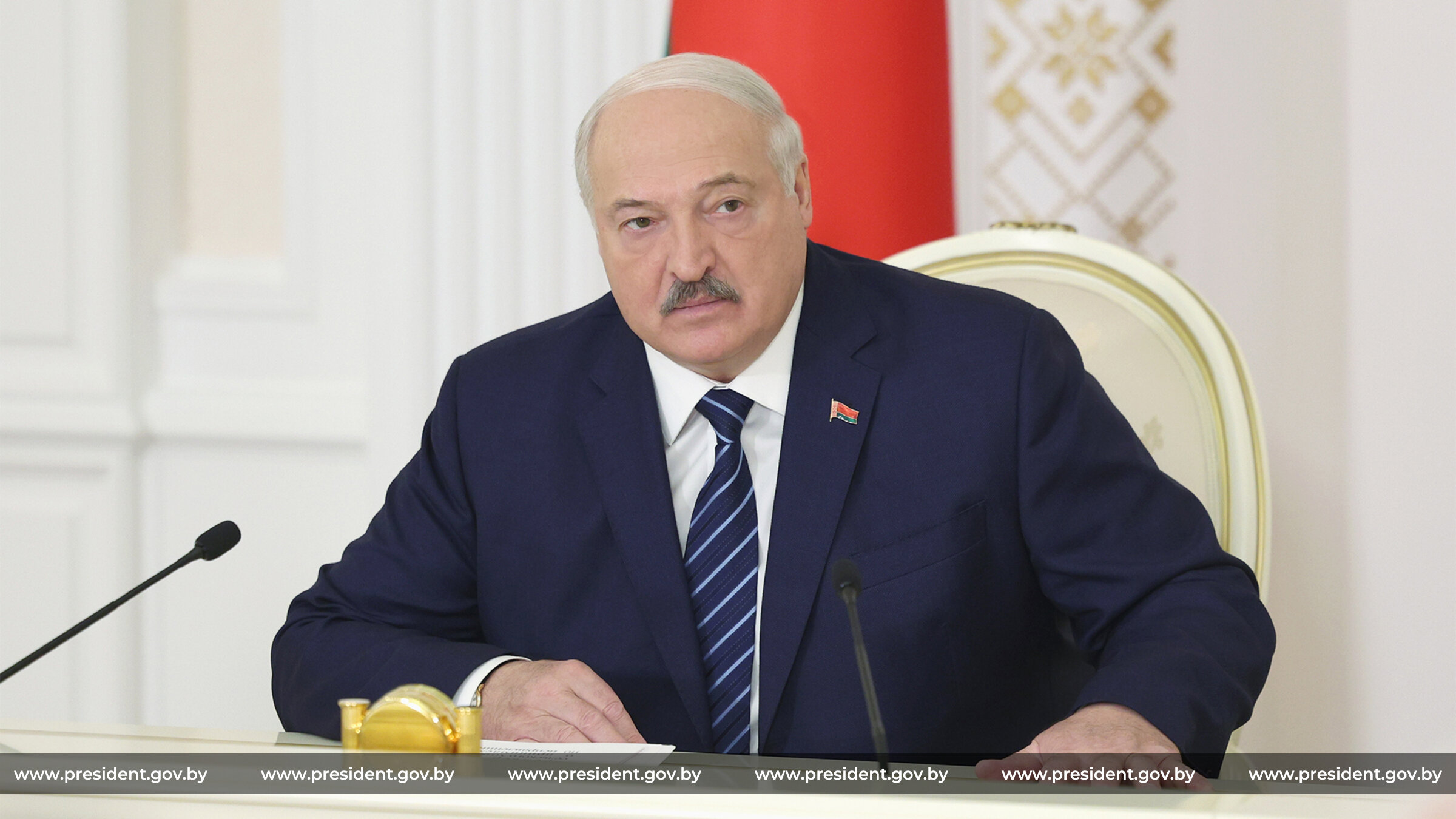3.66 BYN
3.06 BYN
3.60 BYN
President Holds Meeting with Government Leaders
When one hears that "a meeting with government leaders" is taking place, it might sound stern and formal, and not everyone immediately understands that such gatherings often discuss the same everyday issues that many Belarusians talk about at work, at home, or "around the kitchen table," as the saying goes. For instance, questions like: what is the first job after university? Will a young specialist be given an apartment? This is a topic that everyone has pondered at least once.
Other common concerns include oversight activities: will there be more or fewer inspections for businesses and entrepreneurs? What direction are we heading? — the relevance of this question remains ever-present. Or questions about agriculture: what else needs to be done to preserve livestock — both adults and young stock? All those involved in the agro-sector are aware and discuss these issues. Today, the President brought up all these questions for discussion, topics that resonate with the entire Belarusian society or specific professional groups within it.
Gambling industry, rental housing, agricultural challenges
At the round table in the White Hall, all overseeing vice-premiers, the head of government, the ministerial bloc, the Presidential Administration, and the new leadership of the Academy of Sciences gathered. The agenda was concise: gambling industry, creation of a space agency, agricultural problems, and rental housing.
The future of rental housing
The first item on the current agenda was rental housing. "This issue must become one of the priorities for the next five-year plan," emphasized Alexander Lukashenko.
He noted that next year, Belarusians will be presented with a draft of the socio-economic development program, which will be reviewed at the All-Belarusian People's Assembly. By this meeting, the President demanded, all provisions should be clearly and comprehensively regulated: where, who, how quickly, and under what conditions one can apply for rental housing. "And over time, they should have the opportunity to purchase it outright, even in installments," the Head of State added.
According to him, this is especially important for small localities (roughly up to 20,000 residents) and would serve as a strong incentive for residents. "The principle is simple: after working for a certain period, say 10 or 15 years, without interruption, in an organization that provided you with the rental housing, you gain the right to buy it out. This is a fundamental issue, and there are many discussions around it. People are asking us about it," Lukashenko explained.
There is also a question about the buyout of rental housing in rural areas, which has become severely worn and no longer meets sanitary and technical standards.
"Strangely enough, these houses often lack proper management today. On one side, there's an organization that owns them and should carry out capital repairs, as is customary here — roughly once every 30 years. On the other hand, tenants, who live there, are hesitant to invest in current repairs or are trying to save because the housing isn't theirs. Over time, this leads to gradual deterioration," the President pointed out.
Across the country, there are about 3,000–4,000 such houses. Renovating them annually costs over 10 million Belarusian rubles. "And the population has a demand: if the state sells them this housing, they will repair it. But clear conditions are needed for that."
Currently, Belarus has more than 8 million square meters of rental housing, which is arguably the most successful form of social support for professionals. You can move into your apartment or house in the first year of employment. For example, a two-room apartment in Minsk costs residents up to 150 rubles, which is several times less than the market rate. An undeniable bonus. That’s why government proposals are as specific as possible: to build an additional 5 million square meters, distribute them among specialists, and allow buyout options under certain conditions.
Conditions for receiving and buying out rental apartments and houses

Belarusian Prime Minister Alexander Turchin:
"Ten years of employment in a single organization and ten years of residence, along with several additional restrictions. These are general norms. The private norm pertains to residential buildings, including rental properties in rural areas, usually wooden houses. There are about 4,000 such houses. Moreover, citizens should not have previously received state support for housing construction nor own housing."
The rental housing proposed for transfer will be allocated at a subsidized rate—20 square meters per recipient and per family member—based on an estimated, but not exceeding, market value. Any space above 20 square meters will be charged at market rates. Payment for the entire amount will be made in installments over 15 years, with monthly payments equal and without indexation, provided a down payment of at least 10% is made.
Citizens will be able to purchase the rental housing only once. I believe this norm will help retain personnel in small towns, rural areas, and district centers. Many district centers are small localities with populations up to 20,000."
Rental housing is a classic modern management solution. Countries with the highest percentage of state-owned housing in Europe—Netherlands, Austria, Switzerland, Norway, and Denmark—are also some of the wealthiest EU nations. They create rental or, as they call it, "social" housing funds.
Belarusian Prime Minister Turchin:
"All these documents are, of course, not static. We will monitor their implementation in practice. If adjustments are needed, we will make them promptly. I want to reiterate that the President supports these projects. We will refine them technically and expect the Head of State to sign them soon. Our plan has clear goals, specific tasks, and allocated resources. For example, the 5 million square meters of rental housing will require about 13 billion rubles. It's a significant investment, but we believe that implementing these measures will stimulate and help our people secure their own homes. And, crucially, this is especially important for small communities across the country."
Lukashenko to Impose Ban on Borrowing in Gambling

Belarusian President Alexander Lukashenko demanded a ban on banks accepting payments from individuals in favor of foreign gambling operators. This directive was issued on May 29 during a meeting with the government leadership.
One of the topics discussed was the gambling industry. President Lukashenko emphasized that this issue is delicate, touching upon ethics and safety.
"Firstly, with the presence of virtual establishments, there is a need for insurance to prevent children and incapacitated citizens from participating in these games. Secondly, such entertainment should only be accessible to financially capable individuals. In short, we have addressed this issue before, and in Belarus, it is flourishing — thriving and flourishing, as the saying goes. We have experience managing the gambling sector, and based on that experience, let us finally establish clear rules," the President stated. "We know many examples where, for instance, a compulsive gambler cannot stop, and there are no barriers to prevent this. They accumulate debts, take out loans, sell property. The individual suffers, as do their family and society. Some people do pay attention to this."
The head of state announced the necessity of introducing a ban on the practice of borrowing money within gambling venues. "Perhaps, it would also be appropriate to allow family members to impose bans on gambling for individuals with dependencies. Moreover, the money lost from selling apartments and cars often ends up with foreign gambling organizers, which is a fundamental issue. I would like to understand how this matter is proposed to be addressed," he emphasized. "We should prohibit banks from transferring such funds abroad in the first place. Money earned here should be invested in our country. This applies to all sectors. I request a report on how these sensitive issues are being considered in the draft decree."
Creation of Space Agency
The head of state reminded that back in the Soviet times Belarus had a space industry with an impressive component in defense, science, communications and other areas.
"During the years of sovereign development we have made decent progress in these areas, especially now, being under sanctions. We are working on the creation of a Russian-Belarusian spacecraft for ultra-high resolution Earth remote sensing. Almost all the most important components of such a satellite are created in Belarus and put on the Russian platform," said the President. - At the same time, most of the target equipment is manufactured by our Peleng enterprise. Three space programs of the Union State are under development."
Now the National Academy of Sciences performs the main functions of regulating space activities. That is, the management system is still operational.















